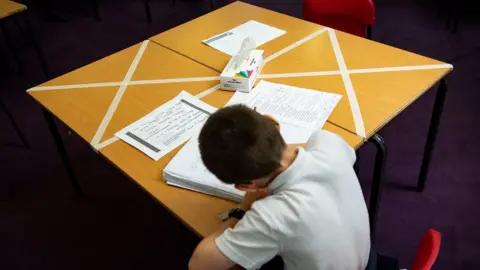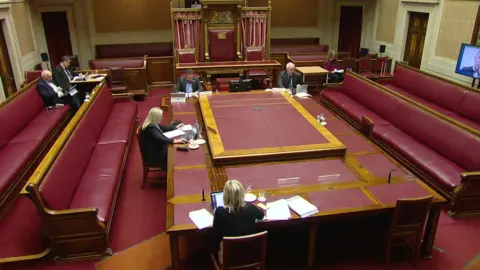NI education: Special educational needs support changes 'need funding'
 Jacob King/PA Wire
Jacob King/PA WireChildren should not wait more than 34 weeks for an assessment and statement of special educational needs (SEN).
That is according to changes planned by the Department of Education (DE) in how children with SEN are supported.
But a DE official told Stormont's education committee it needed another £30m a year to fund the changes.
There have been numerous highly critical reports into failures to adequately support pupils with SEN in Northern Ireland.
In September, the NI Audit Office (NIAO) questioned if the Education Authority's (EA) procedures for those pupils were "fit for purpose".
There is currently a further internal EA investigation into SEN being carried out by three EA board members and two independent experts.
Many of the failings uncovered involved "unnecessary and undue delays" in the statutory assessment and statementing process.
 Getty Images
Getty ImagesIf a pupil is believed to need extra support in school due to SEN, the EA carries out an assessment of their needs and then issues a statement of what additional help they are to receive.
The maximum length of time for that process is meant to be 26 weeks, although there can be valid reasons for it taking longer than that - for example, if the EA needs to get advice about the child from a number of agencies.
The NIAO found that 85% of children were waiting more than the statutory 26 weeks for an assessment and statement of SEN.
Its report also said pupils were waiting an average of 45 weeks for the SEN assessment process to be completed.
Under new regulations and a code of practice for children with SEN, the statutory time limit for the EA to make an assessment and statement will be reduced from 26 to 22 weeks.
However, Ricky Irwin, from the DE, said there would be an "upper limit" of 34 weeks for the EA to complete the process.
"So regardless of the time of year and regardless of the exceptions that may be put in place, the upper time limit would apply and the EA would be required to make the decision on the statement within that time frame," he said.
Effective provision?
Mr Irwin said that was a "sea change" which should bring waiting times down.
But he also said that the DE needed another £30m a year to implement the planned changes, despite spending more than £300m a year on SEN at present.
"We know that there is a total of £313m per annum at this stage being spent right across SEN, across supporting special schools, supporting children who are in mainstream with SEN and statements, SEN transport and pupil support services for SEN through the EA," he said.
"The financial environment next year will be extremely challenging.
"We haven't got any confirmation at this stage around the £30m pressure."
 NI Assembly
NI AssemblyCommittee chair, Alliance MLA Chris Lyttle, asked if there were enough resources to change "abject failure".
"The new regulations and code of practice can introduce new time limits and new deadlines but if the resources aren't in place are they going to address the abject failure to assess and respond to special educational needs of children in a timely way?" he asked.
Questioned by SDLP MLA Daniel McCrossan, Sharon Lawlor from the DE said it was not clear which support for children with SEN was most effective.
"A key criticism from the Northern Ireland Audit Office is EA, or ourselves DE, do not know what special education provision is effective," Ms Lawlor said.
"We need to know for different types of SEN, for different types of children, at different ages in different settings, what is working and what is not working."
Ms Lawlor said that was why each child with SEN would have a personal learning plan under the forthcoming changes.
A number of MLAs - including Sinn Fein's Karen Mullan and the UUP's Robbie Butler - asked if the changes to time limits were "realistic" given past problems.
DUP MLA William Humphrey, meanwhile, pointed out that 22 weeks was "still five and a half months" which brought "huge pressure" on children, their families and their schools.
"It will still remain a massive challenge to do this within 22 weeks," Mr Irwin responded.
There are more than 67,000 children with special educational needs in Northern Ireland's schools - around one in five of all pupils.
